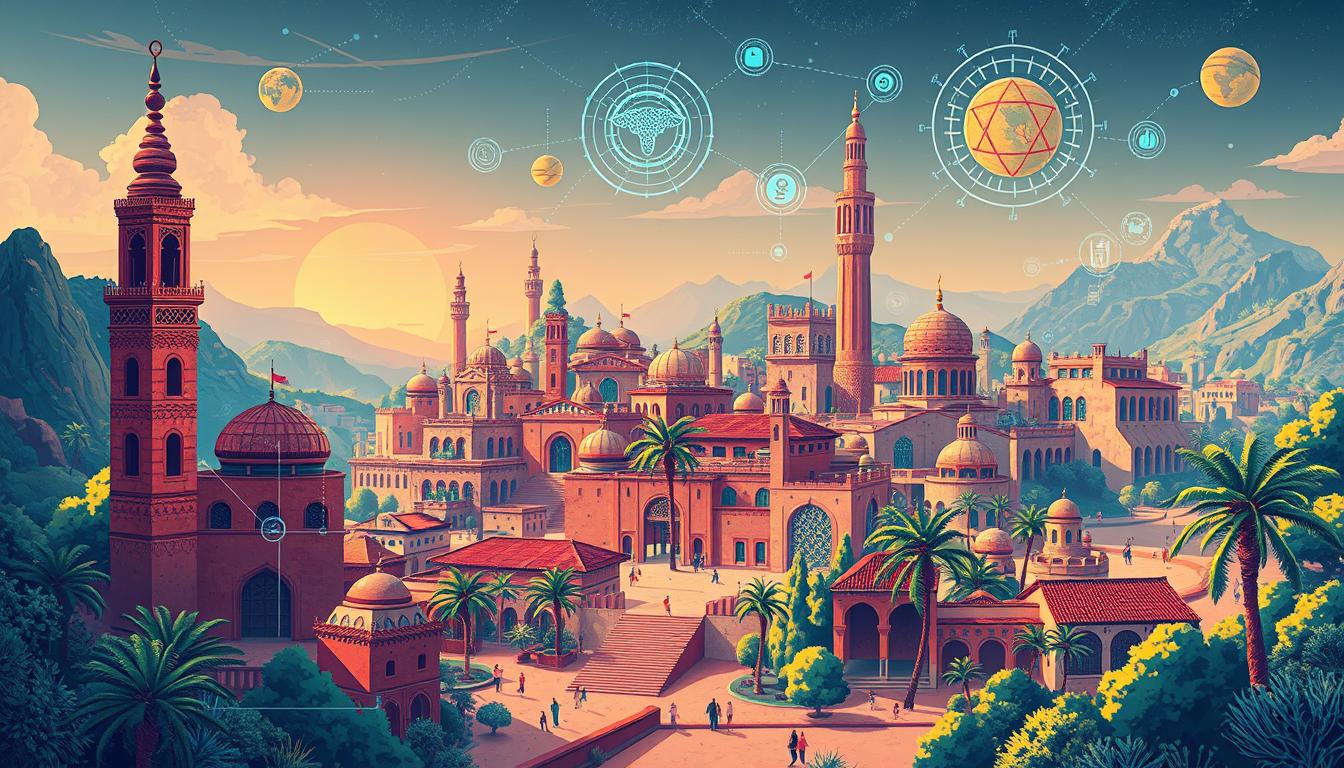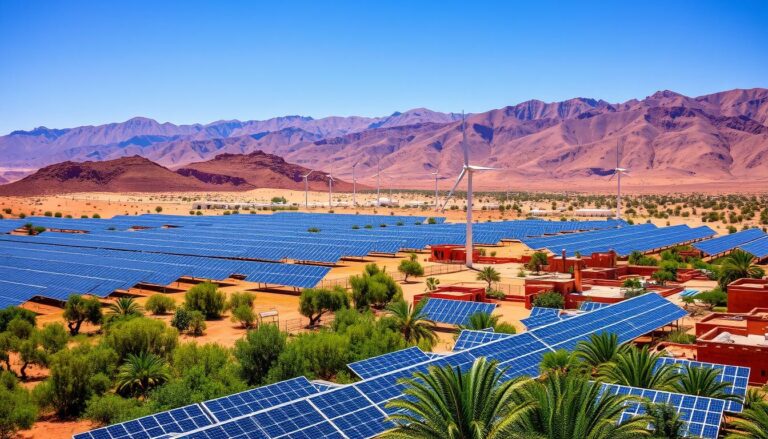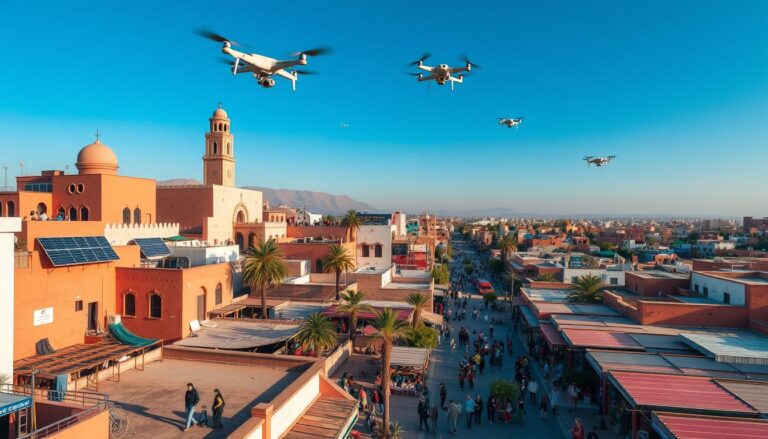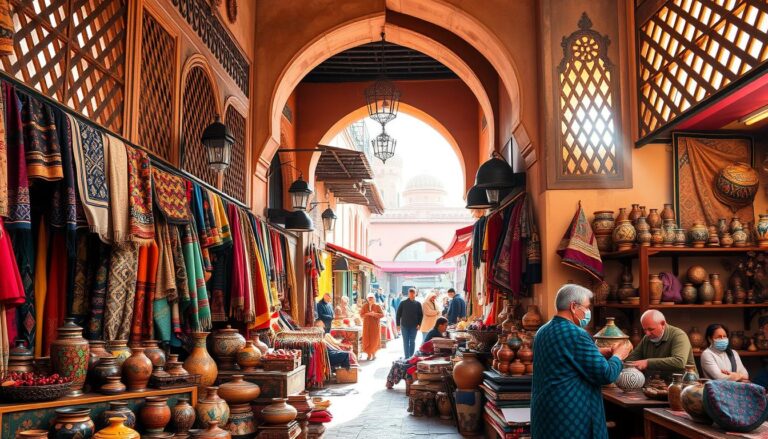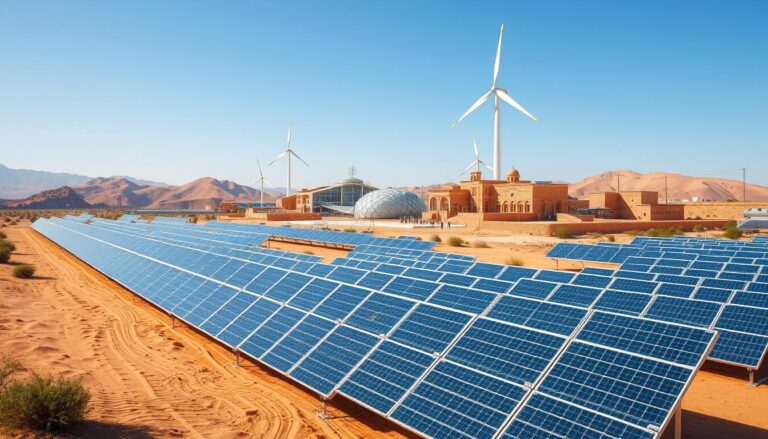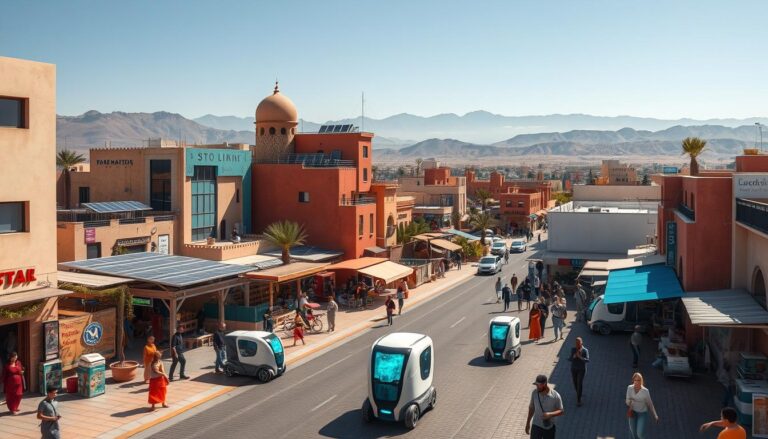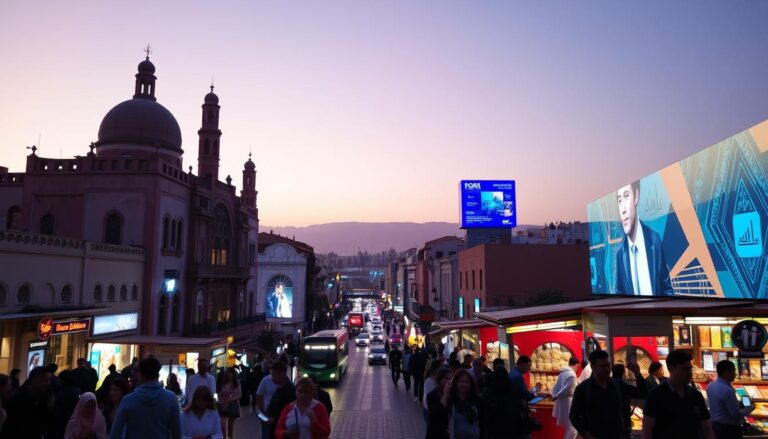What does it take for a nation to fully use artificial intelligence and grow its economy? Morocco is on a path to build a strong AI ecosystem. Its detailed policy framework is the key to this transformation.
The report on Morocco’s AI Policy Framework shows the importance of planning. It offers 44 key recommendations for developing an effective AI strategy. These steps aim to close gaps and boost technology.
The MoroccoAI Conference ’22 and Webinar brought experts like Prof. Geoffrey Hinton and Dr. Bouchra Bouqata together. They created a space for innovation and digital transformation. Their work shows Morocco’s drive to lead in the digital world.
Despite the pandemic, Morocco’s internet and mobile use have grown. This shows the need for a strong AI policy. However, past plans like “Digital Morocco 2013” and “Digital Morocco 2020” didn’t meet their goals. This highlights the need for a clear AI strategy.
Morocco wants to use AI to improve leadership in key sectors like banking and healthcare. AI can change how decisions are made, making Moroccan businesses more competitive globally.
Morocco aims to save millions of hours and increase the IT sector’s GDP to over 10%. It plans to create its own AI unicorn soon. Addressing data privacy and ethical AI is crucial for this goal.
Let’s explore Morocco’s AI policy framework further. We’ll look at government efforts, ethics, and investments that are shaping its digital future.
Introduction to Morocco’s AI Policy Framework
Morocco is leading the way in Africa by embracing artificial intelligence. It’s creating a detailed AI policy to stay ahead in tech. This move aims to make Morocco a leader in new technologies.
Background
Morocco started its AI journey with a strong artificial intelligence strategy. It’s one of five African countries making a mark globally. Morocco has launched four AI projects, showing its dedication to AI.
Tunisia and Egypt lead in AI initiatives in Africa, but Morocco focuses on national strategies. It sees AI as a way to boost the economy, improve education, and build partnerships.
Objectives
Morocco’s AI policy has several main goals. These goals are key to a successful AI strategy.
- Economic Growth: Morocco wants to use AI to grow its economy. It aims to create new opportunities and innovate.
- Societal Benefits: AI will also help society. In Morocco, it will improve healthcare, education, and finance.
- Competitive Edge: Morocco wants to stay competitive in the digital world. By investing in Morocco’s AI development, it hopes to attract more investments and partnerships.
Morocco’s young and dynamic population is ready to use new technologies. It’s joining other African leaders in AI, like Rwanda and Tunisia. This sets Morocco up for big advancements in the future.
Government Initiatives Driving AI Development
Morocco is making big strides in AI thanks to government efforts. These initiatives help grow and innovate in the AI field. They focus on improving the AI ecosystem, developing talent, and building a strong infrastructure for future growth.
Strategic Roadmaps
The Moroccan government has set out detailed plans for AI development. They’re investing in AI research and teaming up with big tech names like Microsoft and Google. These partnerships bring global expertise and local talent together, boosting the AI ecosystem.
Morocco also puts AI at the heart of its national plans. This mirrors the efforts of 21 African countries. Their strategic plans include:
- Educational Programs: Starting AI courses and research projects with places like the African Institute for Mathematical Sciences (AIMS). AIMS has trained over 3,000 students in key fields.
- International Collaboration: Working with global tech leaders to share knowledge and resources. This is similar to IBM’s AI labs in Johannesburg and Nairobi.
- Investment Incentives: Offering financial help to startups and companies working on AI. This encourages new ideas and cutting-edge tech.
Institutional Support
Morocco’s AI success depends on strong support from institutions. Various groups are key to pushing forward government AI plans. This includes setting up AI research centers, like 12 African countries have done.
The Moroccan Agency for Digital Development (ADD) leads the way. It works with schools to create an innovative environment. Morocco also focuses on using AI ethically and protecting data, like 13 African countries do.
Government bodies also host seminars, workshops, and hackathons. These events raise awareness and get people involved in AI. This teamwork helps Morocco use its AI potential fully, making a big impact in Africa.
Lorem ipsum dolor sit amet, consectetur adipiscing elit. Integer posuere erat a ante.
Regulations and Ethical Considerations
In Morocco, AI technology is guided by strong rules and ethics. Data protection is a big part of these rules. They make sure personal info is safe.
Data Governance
Morocco has a law, Law 09-08, to protect personal data. It also has a National Commission for the Control of the Protection of Personal Data (CNDP). The CNDP is working to match Morocco’s data rules with Europe’s.
The Digital Development Agency (ADD) and the Directorate General of Information Systems Security (DGSSI) help enforce these rules. They play a key role in keeping data safe in Morocco.
Ethics in AI
As AI grows, so does the need for ethics. Moroccan laws say using data for AI learning without permission is okay. But, there’s a push for new laws to help make AI decisions.
This push is especially for issues like intellectual property. It shows how important it is to be open about AI use.
Transparency Issues
Transparency is key in Morocco’s AI rules. The country is working to close the tech gap. This includes training and adding AI to school programs.
Working together is vital. Governments, businesses, and civil groups must team up. They need to create rules that protect ideas while encouraging AI innovation.
Reports show the need for clear AI systems. AI on social media can spread false info. This shows how important it is to be open and accountable with AI.
The Role of AI in Morocco’s Digital Transformation
Morocco’s Digital Morocco 2030 strategy is key to its digital growth. It has a $1.1 billion budget to create 240,000 jobs in digital fields by 2030. The focus is on building a strong AI ecosystem for various sectors, including justice and startups.
The plan aims to increase digital exports to 40 billion dirhams and add 100 billion dirhams to the GDP. Morocco wants to move up in the UN Online Services Index from 100th to 50th. This shows its dedication to digital excellence.
Improving 5G coverage to 70% of the country is a big part of the plan. This will help start 3,000 new companies. It will also attract global tech firms in AI and blockchain, creating many jobs.
AI is changing Morocco, especially in law and justice. AI helps lawyers by automating simple tasks. It also helps prevent crimes and stop terrorist threats.
Morocco has strong data protection laws, like Law 09-08 and the CNDP. These laws show Morocco follows strict data protection rules. This is important for using AI responsibly.
The country relies on agencies like the ADD and DGSSI to fight cybercrime. Laws also support using data for AI in a way that respects intellectual property.
Education is key to Morocco’s AI growth. Schools are teaching AI to prepare for the future. Platforms like OpenAI’s GPT chat show how AI can interact with us.
Working together is crucial for Morocco’s AI success. The government, businesses, and groups are all involved. They make sure AI is used in a way that respects rights and encourages innovation.
AI in the Judicial System
Technology is changing many areas around the world, including law in Morocco. AI is making legal processes more efficient. It automates simple tasks and analyzes data deeply.
Judicial Prediction Tools
AI tools for predicting court outcomes are a big step forward in Morocco. These systems use machine learning to guess how cases will end. They help judges make better decisions faster.
These tools get better over time, keeping up with new laws. This ensures justice is served well.
Impact on Legal Processes
AI is making legal work better in Morocco. It speeds up checking documents, saving time. It also finds important details in big data that humans might miss.
AI tools help make laws more fair and clear. This leads to more consistent and fair legal outcomes.
But, using AI in courts comes with challenges. There are worries about bias and how to manage data. It’s important to handle these issues to keep trust in the system.
“AI’s potential to transform the judicial landscape lies not only in its capabilities but also in how ethically and responsibly it is implemented.”
In summary, AI is changing Morocco’s courts for the better. But, we must keep watching and make sure AI is used right. This will help make the courts more efficient and fair.
Investments and Economic Impact
Morocco is attracting a lot of foreign direct investment (FDI). The United Nations Conference on Trade and Development (UNCTAD) World Investment Report 2023 highlights this. In 2022, Morocco got the fifth-most FDI in Africa, with $2.1 billion.
Manufacturing and telecommunications are key areas for investment. France, the United Arab Emirates, and Spain have a big role in Morocco’s FDI.
VC Investments in AI
AI investments in Morocco are changing the economy. Venture capital (VC) is pouring into new AI projects. The Investment Charter, adopted in December 2022, aims to boost private investment.
This will help AI ventures grow. The goal is to make private investment two-thirds of the total by 2035.
AI Software Development
AI software development is booming. Startups and big tech companies are leading the way. This is making Morocco’s economy stronger.
The Moroccan government has signed 72 investment treaties and 62 economic agreements. These agreements protect and promote investments. Silicon Valley giants are also showing interest, boosting innovation and the economy.
Morocco’s AI startup scene is thriving. Entrepreneurs are creating new solutions in many areas. This growth in AI software development is making Morocco more technologically advanced and stable economically.
Challenges and Risks Associated with AI
AI in Morocco offers many chances, but it also brings big challenges and risks. One big AI challenge is algorithmic discrimination. This happens when AI systems unfairly treat certain groups. It’s a big worry in areas like the courts and jobs, where fairness is key.
Privacy is another big issue. AI can collect and analyze a lot of data, which can harm our privacy. We need strong risk management in AI to protect our data and follow privacy rules.
Cybersecurity is also a big concern. AI systems are now targets for hackers. We need better security and constant checks to keep our data and systems safe.
To tackle these risks, we must set high ethical standards. Ethical AI needs rules and teamwork from governments, businesses, and groups. The event in Rabat from October 22 to 24, 2024, will focus on these issues. It will bring together experts to talk about AI’s role in the Chemical Weapons Convention and more.
The event will also talk about AI challenges and how they affect different areas. It will cover AI in chemistry, the chemical industry, and fighting terrorism. This shows how important it is to work together for ethical AI. We want AI to help everyone, not just a few, while keeping risks low.
AI and Intellectual Property
The mix of AI and intellectual property is key in Morocco’s tech policies. New laws aim to update old rules for AI’s growth. As AI gets better, following rules and being open is more important than ever.
Legislative Changes
In Morocco, using data for AI learning in schools is okay under Law No. 2.00. But, there’s a need for more rules to use data for AI, even with copyrighted stuff. Also, new rules should match copyright laws for text and data mining to help AI grow.
Encouraging Compliance and Transparency
New policies will help get licenses for using data in AI. A big, safe digital database could help catch and stop unauthorized use. Also, deep fake copyright should go to both the original creator and the AI data user.
New data IP rights should cover both exclusive and payment rights based on data value. This will affect how data moves and wealth is made in different areas. To enforce these rights, systems for sharing info between data owners and users are needed. This will help keep AI use ethical and innovation strong in Morocco.
- Ensure legislative measures align with AI intellectual property needs
- Facilitate policy interventions for licensing data usage
- Introduce new IP rights for data, ensuring fair competition
- Develop secure digital databases for enforcing rights
- Promote collective management systems for data usage
- Encourage transparency through flexible mechanisms
AI Research and Innovation in Morocco
Morocco is leading AI research in Africa, using AI to boost national and regional growth. Universities and public-private partnerships are key to this success. They help both AI research and its practical use grow.
University Research Initiatives
Moroccan universities are leading in AI research. Places like Mohammed VI Polytechnic University and the University of Hassan II are working on AI projects. They aim to use AI in fields like agriculture, healthcare, and transportation.
By joining global conferences and publishing in top journals, Moroccan researchers add a lot to AI knowledge worldwide.
Public and Private Sector Collaboration
The success of AI in Morocco relies on teamwork between the public and private sectors. The government has pushed for partnerships to use AI fully. For example, the AI Movement Center in Morocco, backed by UNESCO, is a result of these efforts.
This center is a key spot for AI research, where local and international experts work on new AI solutions. These partnerships help create AI solutions for Morocco, like better farming tools and smart cities.
These efforts also help create jobs, offer education, and boost the economy.
Workshops and forums are held to talk about AI’s future in Africa. The “Future of AI in Africa by 2050” workshop, with over 20 countries, showed AI’s role in sustainable development. These events are key for sharing knowledge and learning together, vital for innovation in Morocco.
Together, universities and public-private partnerships are building a strong base for Morocco’s AI leadership. These efforts not only improve Morocco’s AI skills but also make it a model for AI progress in Africa and worldwide.
The Future Outlook of Morocco’s AI Policy Framework
The future of AI in Morocco looks bright with big steps expected in many areas. The government has set a strong base for AI strategic development. This ensures the policy keeps up with fast tech changes.
Experts think AI could make a big difference in Morocco’s industries, just like in other African countries. For example, AI in Rwanda and Ghana for medical imaging could change healthcare in Morocco. This could help find diseases early and treat them better, improving health for everyone.
-
In agriculture, AI can help farmers in Morocco make better choices about fertilizers and crops. This could make farming more productive and profitable. AI can also help make farming more sustainable, like in Nigeria and Kenya.
-
Healthcare in Morocco is set to get a lot better with AI. AI can help doctors make more accurate diagnoses, just like in Ghana and Rwanda. It can also make getting medical supplies to remote areas easier, thanks to companies like Zipline.
-
AI can also make cities smarter, like in South Africa. It can help plan cities better, improving water and sanitation. This makes cities better places to live.
Big tech companies are investing a lot in Morocco’s AI future. This means more opportunities for local developers, thanks to partnerships like Microsoft’s in Africa. Training and education will be key to building a skilled AI workforce.
Working with global groups is also important. The Partnership for Global Inclusivity on AI (PGIAI) shows how companies like Amazon, Google, and IBM are working together. This ensures AI is used in a way that’s fair and beneficial for everyone.
These plans show Morocco could become a leader in AI globally. By using AI wisely, Morocco can drive innovation and growth. This will help everyone in the country move forward together.
Conclusion
Morocco’s AI integration is more than a strategy; it’s a well-thought-out plan. It aims to make Morocco a leader in technology and innovation. The country has seen a 15% annual growth in AI use since 2018, showing its commitment to AI’s role in sectors like healthcare.
This growth rate is impressive, even if it’s a bit slower than India’s 18%. Morocco’s efforts to use AI for the betterment of society are clear. Compared to Tunisia’s 12% growth, Morocco’s progress in AI is notable.
Morocco’s AI strategy shows a strong focus on technology and ethics. The country follows UNESCO’s ethical AI guidelines, showing it values responsible AI development. This commitment to ethics and innovation is a key part of Morocco’s AI strategy.
Morocco has seen real benefits from AI, especially in healthcare. AI has improved cancer diagnosis accuracy to 96%, up from 70% with traditional methods. AI has also cut down diagnostic errors by 25% to 30%, helping with complex diseases.
This success shows Morocco’s advanced tech capabilities and the value of ethical AI. Morocco’s AI policy is forward-looking and ethical, making it a model for other countries. As Morocco grows its AI, it will continue to show the importance of using AI wisely and ethically.
Source Links
- MoroccoAI
- Morocco: Towards the implementation of a national policy dedicated to AI to accelerate digital transformation? – ActuIA
- Responsible Artificial Intelligence Policies and Regulations in Africa: The gaps and a way forward
- Governing AI in Africa: Policy frameworks for a new frontier – Microsoft On the Issues
- Envisioning Africa’s AI governance landscape in 2024
- How AI is impacting policy processes and outcomes in Africa
- AI For Good: How Africa is Shaping the Responsible Use of Artificial Intelligence
- Morocco: Artificial Intelligence in the Moroccan legal framework
- Morocco turns to AI, blockchain to achieve ‘digital hub’ goal by 2030
- Malabo: Morocco’s AI Progress Highlighted at 11th ASSECAA Consultative Meeting
- AI regulation and policy in Africa
- Morocco – United States Department of State
- No title found
- Note by the Technical Secretariat: Global Conference: The Role of Artificial Intelligence in Advancing the Implementation of the Chemical Weapons Convention
- Towards an Ethics of Artificial Intelligence | United Nations
- Ethical and Legal Regulation of Using Artificial Intelligence in Morocco | Jabir | Journal of Digital Technologies and Law
- Forum on AI in Africa: AI Movement in partnership with UNESCO Host Event in Rabat
- New York: Morocco, U.S. Organize High-Level Event on AI and Sustainable Development in Africa
- United States and Eight Companies Launch the Partnership for Global Inclusivity on AI – United States Department of State
- Applications of Artificial Intelligence in Morocco’s Healthcare Sector A Springboard to Medical Excellence

The Editorial Team is a passionate group of Morocco enthusiasts dedicated to sharing the beauty, culture, and wonders of this captivating country. With diverse backgrounds and a deep love for travel, we strive to bring you engaging and informative content that inspires your Moroccan adventures. From uncovering hidden gems and sharing local insights to exploring mouthwatering cuisine and showcasing the vibrant lifestyle, our team is committed to providing you with valuable resources and exciting stories that enhance your exploration of Morocco. Join us on this journey as we celebrate the rich heritage and unforgettable experiences that make Morocco truly special.

